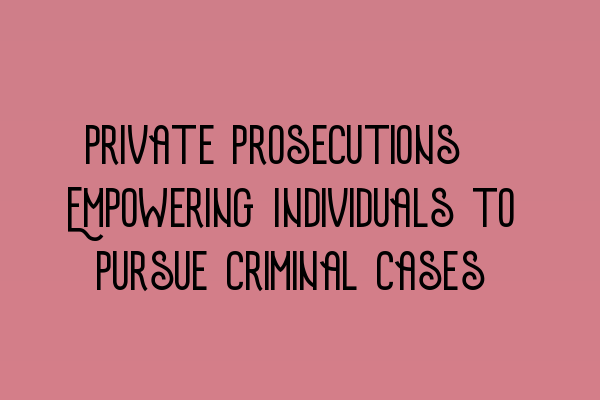Private Prosecutions: Empowering Individuals to Pursue Criminal Cases
Welcome to the SQE Criminal Law & Practice UK blog! In this post, we will explore the concept of private prosecutions and how they empower individuals to pursue criminal cases. Private prosecutions serve as an alternative avenue for seeking justice, allowing individuals to take legal action against those who have committed crimes. Through this post, we will delve into the benefits of private prosecutions and shed light on the process involved.
Understanding Private Prosecutions
Private prosecutions are criminal prosecutions initiated by individuals, organizations, or businesses instead of the state authorities. They offer an opportunity for justice to be served when traditional avenues, such as police investigations or actions by the Crown Prosecution Service (CPS), are inadequate or not pursued.
Private prosecutions can be undertaken for a wide range of offenses, including fraud, theft, assault, harassment, and more. By initiating a private prosecution, individuals can hold wrongdoers accountable and seek redress for the harm caused.
Benefits of Private Prosecutions
The rise in private prosecutions can be attributed to the numerous benefits they offer:
- Accountability: Private prosecutions allow individuals to hold offenders accountable, ensuring that justice is served and allowing victims to seek closure.
- Control: Individual prosecutors have control over the progress of the case, including the choice of legal representation and the evidence presented.
- Speed: Private prosecutions can often be faster than traditional routes, as individuals can drive the process and avoid delays sometimes associated with state authorities.
- Flexibility: Private prosecutions offer flexibility in terms of the actions that can be pursued and the remedies sought. Victims can tailor the case to their specific circumstances and seek appropriate justice.
- Equal Access: Private prosecutions promote equal access to justice, empowering individuals who may otherwise be overlooked by the state authorities.
The Process of Private Prosecutions
Private prosecutions follow a structured process that consists of the following key steps:
- Evidence Gathering: The prosecutor, usually represented by a solicitor with expertise in criminal law, collects evidence to build a strong case.
- Legal Advice: Seeking legal advice is crucial in evaluating the prospects of success and understanding the available legal options.
- Court Proceedings: Once satisfied with the evidence and legal advice, the prosecutor files the necessary documents with the court to initiate the prosecution.
- Case Management: The case progresses through various stages, including pre-trial hearings, disclosure of evidence, and trial preparation.
- Trial: The trial takes place, where evidence is presented, arguments are made, and a verdict is reached.
- Sentencing: If the defendant is found guilty, the court determines an appropriate sentence.
“Private prosecutions offer individuals the power to seek justice and robustly pursue criminal cases.”
Understanding the process involved is essential for individuals considering private prosecutions. Consulting with a reputable legal firm specializing in criminal law is crucial, as it ensures expert guidance and representation throughout the proceedings.
If you are interested in learning more about criminal law and practice in the UK, consider checking out our related articles:
- SQE 1 Practice Exam Questions
- SQE 1 Practice Mocks FLK1 FLK2
- SQE 2 Preparation Courses
- SQE 1 Preparation Courses
- SRA SQE Exam Dates
Private prosecutions offer individuals the power to seek justice and robustly pursue criminal cases. The ability to hold offenders accountable and obtain redress is vital for maintaining a fair and just society. If you are considering a private prosecution, it is crucial to seek expert legal advice to navigate the intricacies of the process and maximize your chances of success.
Thank you for reading this blog post. For more information on criminal law and practice in the UK, stay tuned to our blog!
